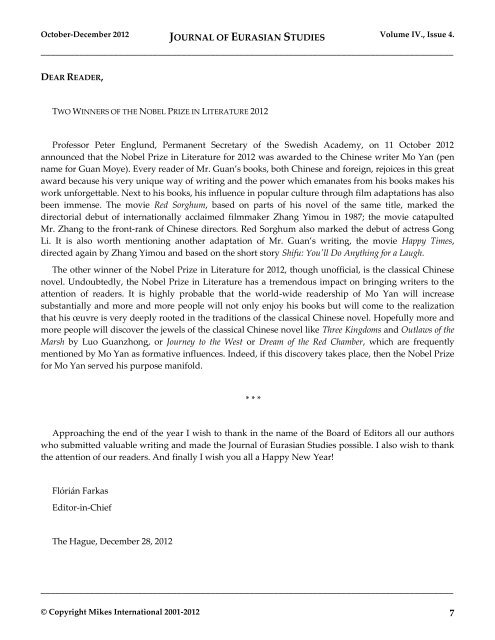Create successful ePaper yourself
Turn your PDF publications into a flip-book with our unique Google optimized e-Paper software.
October-December 2012 JOURNAL OF EURASIAN STUDIES Volume IV., Issue 4.<br />
_____________________________________________________________________________________<br />
DEAR READER,<br />
TWO WINNERS OF THE NOBEL PRIZE IN LITERATURE 2012<br />
Pr<strong>of</strong>essor Peter Englund, Permanent Secretary <strong>of</strong> the Swedish Academy, on 11 October 2012<br />
announced that the Nobel Prize in Literature for 2012 was awarded to the Chinese writer Mo Yan (pen<br />
name for Guan Moye). Every reader <strong>of</strong> Mr. Guan’s books, both Chinese and foreign, rejoices in this great<br />
award because his very unique way <strong>of</strong> writing and the power which emanates from his books makes his<br />
work unforgettable. Next to his books, his influence in popular culture through film adaptations has also<br />
been immense. The movie Red Sorghum, based on parts <strong>of</strong> his novel <strong>of</strong> the same title, marked the<br />
directorial debut <strong>of</strong> internationally acclaimed filmmaker Zhang Yimou in 1987; the movie catapulted<br />
Mr. Zhang to the front-rank <strong>of</strong> Chinese directors. Red Sorghum also marked the debut <strong>of</strong> actress Gong<br />
Li. It is also worth mentioning another adaptation <strong>of</strong> Mr. Guan’s writing, the movie Happy Times,<br />
directed again by Zhang Yimou and based on the short story Shifu: You'll Do Anything for a Laugh.<br />
The other winner <strong>of</strong> the Nobel Prize in Literature for 2012, though un<strong>of</strong>ficial, is the classical Chinese<br />
novel. Undoubtedly, the Nobel Prize in Literature has a tremendous impact on bringing writers to the<br />
attention <strong>of</strong> readers. It is highly probable that the world-wide readership <strong>of</strong> Mo Yan will increase<br />
substantially and more and more people will not only enjoy his books but will come to the realization<br />
that his œuvre is very deeply rooted in the traditions <strong>of</strong> the classical Chinese novel. Hopefully more and<br />
more people will discover the jewels <strong>of</strong> the classical Chinese novel like Three Kingdoms and Outlaws <strong>of</strong> the<br />
Marsh by Luo Guanzhong, or Journey to the West or Dream <strong>of</strong> the Red Chamber, which are frequently<br />
mentioned by Mo Yan as formative influences. Indeed, if this discovery takes place, then the Nobel Prize<br />
for Mo Yan served his purpose manifold.<br />
* * *<br />
Approaching the end <strong>of</strong> the year I wish to thank in the name <strong>of</strong> the Board <strong>of</strong> Editors all our authors<br />
who submitted valuable writing and made the <strong>Journal</strong> <strong>of</strong> <strong>Eurasian</strong> <strong>Studies</strong> possible. I also wish to thank<br />
the attention <strong>of</strong> our readers. And finally I wish you all a Happy New Year!<br />
Flórián Farkas<br />
Editor-in-Chief<br />
The Hague, December 28, 2012<br />
_____________________________________________________________________________________<br />
© Copyright Mikes International 2001-2012 7

















